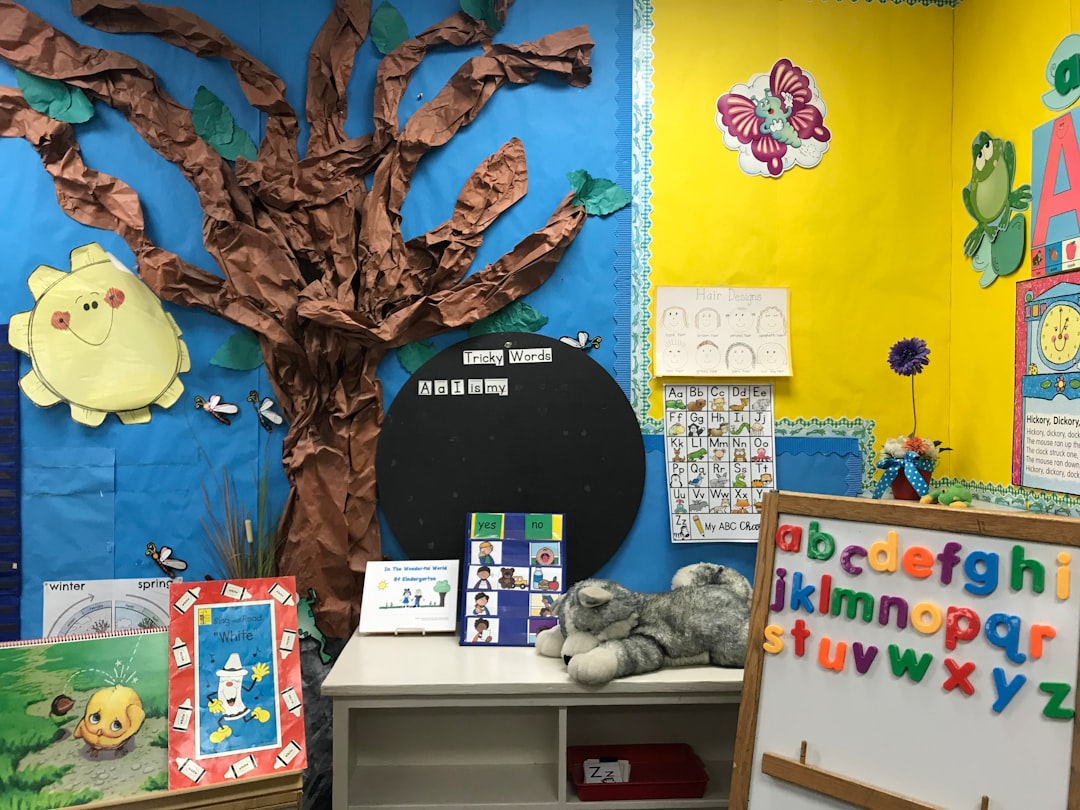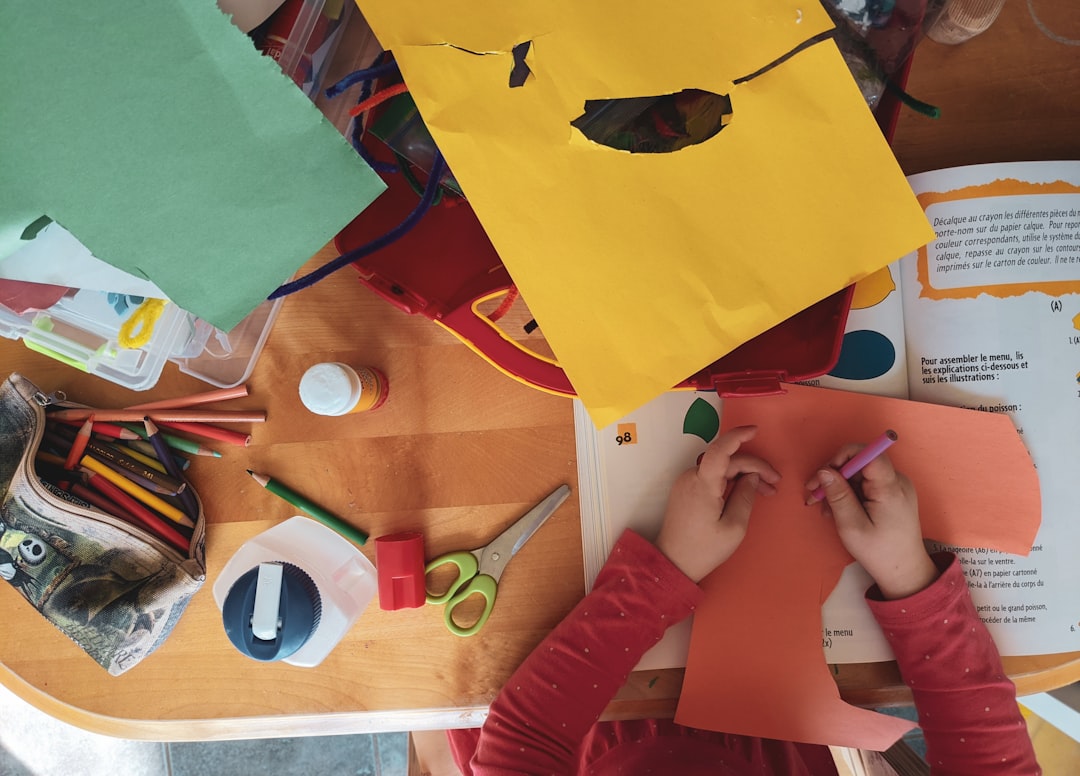Early Childhood Education Degree is a crucial field that lays the foundation for a child’s future development and success. If you are passionate about working with young children. And want to make a positive impact on their lives. Pursuing a degree in early childhood education is a great step toward achieving your career goals.
However, the path to earning your degree can be overwhelming without the proper guidance. In this blog post, I want to share the seven essential steps you need to take to earn your early childhood education degree. And embark on a fulfilling career in this important field.

Understanding the Importance of an Early Childhood Education Degree
Early childhood education plays a vital role in shaping a child’s development and future success. It is during the early years that children’s critical skills are formed. Also, their capacity to learn and grow is set in motion. Understanding the importance of early childhood education is essential for anyone considering pursuing a degree in this field.
1. Holistic Development:
Early Childhood Education Degree focuses on the overall development of a child, including their cognitive, social, emotional, and physical well-being. By providing a nurturing and stimulating environment, educators can support children in developing these, essential skills and abilities.
2. School Readiness:
High-quality Early Childhood Education Degree programs help children develop foundational skills. They need to succeed in school and beyond. These skills include language and literacy skills, and numeracy skills. Problem-solving abilities, and social skills.
3. Long-Term Benefits:
Numerous studies have shown that children who participate in quality Early Childhood Education Degree programs have better academic, social, and emotional outcomes later in life. They are more likely to graduate from high school. Pursue further education, and secure stable employment.
4. Closing the Achievement Gap:
Early Childhood Education Degree has been recognized as a powerful tool for closing the achievement gap among children from different socio-economic backgrounds. By providing equal access to quality education during the early years. We can reduce disparities and give all children an equal chance to succeed.
5. Brain Development:
The early years are a critical period for brain development. Research has shown that the first five years of life are when the brain undergoes its most rapid growth. Quality Early Childhood Education Degree programs provide the necessary stimulation and experiences for optimal brain development.
6. Social and Emotional Skills:
Early Childhood Education Degree helps children develop essential social. And emotional skills, such as empathy, self-regulation, and problem-solving. These skills are crucial for building positive relationships. Managing emotions, and navigating social interactions.
7. Parental Involvement:
Early Childhood Education Degree also emphasizes the importance of involving parents and families in a child’s education. By partnering with parents, educators can create a strong support system. That extends beyond the classroom and contributes to a child’s overall well-being and success.
Understanding the importance of early childhood education is the first step in embarking on a fulfilling career in this field. By recognizing the profound impact early education can have on a child’s life. You can contribute to creating a brighter future for the next generation.

Step 1: Research and choose the right program
Embarking on a journey to earn your early childhood education degree is an exciting and important decision. Before diving in, it is crucial to conduct thorough research. And choose the right program that aligns with your career goals and aspirations.
Here are some essential steps to help you navigate the process of Early Childhood Education Degree:
1. Identify Your Goals and Interests:
Take some time to reflect on your career goals and interests within the field of Early Childhood Education Degree. Are you passionate about working with infants and toddlers, or do you have a particular interest in special education? Knowing what areas of Early Childhood Education Degree appeal to you will help guide your research.
2. Determine Your Preferred Learning Format:
Consider your preferred learning format. Do you thrive in a traditional classroom setting, or are you more comfortable with online or blended learning options? Keep in mind that each format has its own advantages and disadvantages, so choose the one that aligns with your learning style and commitment.
3. Accreditation and Program Quality:
Ensure that the program you choose is accredited by a reputable accrediting body. Accreditation ensures that the program meets quality standards and is recognized by employers and licensing bodies. Look for programs that are accredited by organizations such as the National Association for the Education of Young Children (NAEYC) or the Council for Accreditation of Educator Preparation (CAEP).
4. Curriculum and Course Offerings:
Review the program’s curriculum and course offerings to ensure. They cover the essential knowledge and skills needed for a successful career in Early Childhood Education Degree.
Look for a diverse range of courses that cover child development, curriculum planning, and family engagement. And assessment techniques. Consider whether the program offers any specialized tracks or concentrations that align with your interests.
5. Field Experience and Internship Opportunities:
Practical experience is vital in the field of Early Childhood Education Degree. Check if the program provides ample opportunities for field experience and internships. These experiences will provide you with hands-on learning and allow you to apply the theoretical knowledge gained in the classroom.
6. Faculty Expertise and Support:
Research the faculty members within the program and their expertise. Take note of their qualifications, and research interests. And experience in the field of early childhood education.
Also, the faculty members who are actively engaged in research and have real-world experience. Can provide valuable guidance and mentorship throughout your journey.
7. Cost and Financial Aid Options:
Consider the cost of the program and explore the financial aid options available to support your education. Research scholarships, grants, and loans that are specifically tailored for students pursuing a degree in Early Childhood Education Degree.
Consider reaching out to the financial aid office of the institution to explore all possible avenues for funding.
By conducting thorough research and selecting the right program that aligns with your goals and interests. You are taking the crucial first step towards earning your early childhood education degree.
Remember to reach out to admissions counselors, and attend information sessions. And connect with current students to gather all the necessary information before making your decision.

Step 2: Develop a strong foundation in child development
Once you have selected the right program for your early childhood education degree. It is important to focus on developing a strong foundation in child development. Understanding the various aspects of child development is essential for effectiveness. Working with young children and promoting their overall growth and learning.
Here are some key steps to help you build a solid understanding of child development:
1. Study Developmental Theories:
Familiarize yourself with different theories of child development. Such as Piaget’s cognitive development theory, Erikson’s psychosocial development theory, and Vygotsky’s sociocultural theory. These theories provide valuable insights into how children learn, grow, and develop across various domains. Including cognitive, physical, social, and emotional development.
2. Explore Developmental Milestones:
Learn about the typical developmental milestones that children achieve at different ages. This knowledge will help you assess and monitor children’s development. Identify potential developmental delays or concerns. And plan appropriate interventions or modifications to support individual children’s needs.
3. Understand Individual Differences:
Recognize that every child is unique and develops at their own pace. Gain an understanding of the concept of individual differences in child development, including factors that influence development.
Such as genetics, environment, and culture. This knowledge will enable you to create inclusive and responsive learning environments. That cater to the diverse needs and strengths of all children.
4. Learn about Developmentally Appropriate Practices:
Familiarize yourself with developmentally appropriate practices in Early Childhood Education Degree. These practices involve tailoring teaching strategies, and curricula. And learning experiences to match the developmental abilities and interests of children.
By understanding the principles of developmentally appropriate practices. You can create engaging and meaningful learning opportunities for young children.
5. Gain Practical Experience:
Seek opportunities to gain practical experience working with young children. This can include participating in field experiences, internships, or practicum placements in early childhood settings.
Through hands-on experiences, you will have the opportunity to observe and interact with children. Apply theoretical knowledge in real-world contexts. And develop essential skills in supporting their development and learning.
6. Stay Updated with Current Research:
Stay informed about the latest research and advancements in the field of child development. Subscribe to academic journals, and attend conferences or webinars. And follow reputable organizations and researchers in the Early Childhood Education Degree field.
By staying current with research findings, you can enhance your understanding of child development. And incorporate evidence-based practices into your work.
Developing a strong foundation in child development is essential for a successful career in early childhood education. By studying developmental theories, and exploring milestones.
Understanding individual differences, and implementing developmentally appropriate. practices, gaining practical experience, and staying updated with research. You will be well-prepared to support the holistic development and learning of young children in your future profession.

Step 3: Gain practical experience through internships and fieldwork
Once you have developed a strong foundation in child development, it is crucial to gain practical experience in the field of Early Childhood Education Degree.
Practical experience through internships and fieldwork provides invaluable opportunities. For future early childhood educators to apply their knowledge, skills, and theories in real-world settings.
Here are some essential steps to help you gain practical experience:
1. Research Internship Opportunities:
Begin by researching internship opportunities available in your area. Look for organizations, schools, and early childhood centers that offer internships or fieldwork placements to aspiring educators. Consider reaching out to local schools or community centers to inquire about internship opportunities and application processes.
2. Meet with a Career Advisor:
Schedule a meeting with a career advisor or academic advisor at your educational institution. They can provide guidance and support in finding suitable internships or fieldwork placements. They may have connections with local organizations. And can help you navigate the application process.
3. Create a Strong Resume and Cover Letter:
Prepare a well-crafted resume and cover letter highlighting your skills, experiences, and passion for Early Childhood Education Degree. Tailor your application materials to each internship opportunity you apply for. Showcasing your suitability for the specific role and organization.
4. Apply for Internships:
Begin applying for internships or fieldwork placements that align with your career goals and interests. Submit your application materials and follow up with any required documentation.
Such as transcripts or letters of recommendation. Be mindful of application deadlines and any specific requirements set by the organization.
5. Prepare for Interviews:
If selected for an interview, take the time to prepare and practice your interview skills. Research the organization, familiarize yourself with its mission and values, and anticipate common interview questions. Reflect on your past experiences and how they relate to the position you are applying for.
6. Network and Seek Recommendations:
Build connections within the early childhood education field by attending professional development events, conferences, or workshops.
Network with professionals in the field and seek recommendations from teachers, professors, or previous supervisors who can vouch for your skills and commitment to early childhood education.
7. Reflect and Learn:
Throughout your internship or fieldwork experience, reflect on your observations, interactions with children, and collaboration with colleagues.
Take the opportunity to learn from experienced educators, ask questions, and seek feedback on your performance. Use this experience to enhance your understanding of child development and refine your teaching practices.
Gaining practical experience through internships and fieldwork is essential for becoming a successful early childhood educator. It allows you to apply theoretical knowledge, develop practical skills, and build professional connections in the field.
By actively seeking internships, preparing strong application materials, and networking. And reflecting on your experiences, you will be well-equipped to embark on a rewarding career in Early Childhood Education Degree.

Step 4: Cultivate effective teaching strategies and techniques
Once you have gained practical experience through internships and fieldwork. It is important to continue cultivating effective teaching strategies and techniques as you work towards earning your early childhood education degree.
These strategies and techniques will contribute to your success as an educator and enhance the learning experiences of young children.
Here are some essential steps to help you cultivate effective teaching strategies. And techniques for the Early Childhood Education Degree:
1. Stay Updated on Research and Best Practices:
As an early childhood educator, it is crucial to stay informed about the latest research and best practices in the field. Regularly read books, and attend workshops. And participate in professional development opportunities to ensure you are using evidence-based strategies and techniques.
2. Reflect on Your Teaching Practice:
Take time to reflect on your teaching practice and assess the effectiveness of your strategies and techniques in an Early Childhood Education Degree. Consider incorporating self-reflection exercises into your daily routine to identify areas for improvement and make necessary adjustments.
3. Seek Mentorship and Guidance:
Connect with experienced early childhood educators who can serve as mentors and provide guidance on effective teaching strategies. Engage in conversations with these mentors, and ask questions. And seek their advice on specific teaching challenges you may encounter.
4. Collaborate with Colleagues:
Collaborate with your colleagues to share ideas, lesson plans, and teaching strategies. Join professional organizations or online forums where you can interact with other educators and engage in discussions about effective teaching practices.
5. Adapt Strategies to Individual Learners:
Recognize that each child is unique and may require different teaching strategies to support their learning. Be adaptable and responsive to the needs of individual learners. And consider differentiated instruction to meet diverse learning styles and abilities.
6. Incorporate Play-Based Learning:
Incorporate play-based learning into your teaching strategies. Play is a fundamental aspect of early childhood development and provides opportunities for children to explore. Experiment and learn in a hands-on and engaging manner in the Early Childhood Education Degree.
7. Use Technology as an Educational Tool:
Embrace the use of technology as an educational tool. Explore age-appropriate educational apps, websites, and digital resources. That can enhance learning experiences and provide interactive activities for young children.
8. Continuously Assess and Reflect:
Regularly assess the effectiveness of your teaching strategies and techniques through ongoing observation and assessment. And reflection. Use data and feedback from students, parents, and colleagues to inform your instructional decisions. Also, make necessary adjustments to optimize learning outcomes.
By actively cultivating effective teaching strategies and techniques. You will be better equipped to create engaging learning environments, promote positive learning experiences. And support the development and growth of young children.
As you progress toward earning your early childhood education degree. Continuously strive to enhance your teaching practice and stay committed to lifelong learning and professional development.

Step 5: Stay updated on current research and best practices
As an early childhood educator, it is crucial to stay informed about the latest research and best practices in the field. The field of Early Childhood Education Degree is continuously evolving.
With new research, emerging and innovative strategies are being developed. By staying updated on current research and best practices. You can ensure that you are providing the best possible education and support to young children.
Here are some essential steps to help you stay updated on current research and best practices:
1. Read Professional Journals and Publications:
Subscribe to and regularly read professional journals and publications that focus on Early Childhood Education Degree. These resources provide valuable insights into the latest research and trends. And best practices in the field. Stay updated on topics. Such as child development, curriculum design, assessment, and classroom management.
2. Attend Workshops and Conferences:
Participate in workshops, conferences, and professional development opportunities related to early childhood education. These events offer opportunities to learn from experts in the field. Engage in discussions, and network with other educators. Stay updated on current research findings. And new teaching methodologies. And innovative approaches to Early Childhood Education Degree.
3. Join Professional Organizations:
Become a member of professional organizations dedicated to early childhood education. These organizations often provide access to resources, research publications, and networking opportunities. Engage in discussions and collaborate with other educators to learn about current research and best practices.
4. Engage in Continued Education Courses:
Take advantage of continued education courses related to early childhood education. These courses offer opportunities to expand your knowledge, learn about new teaching strategies. And enhance your skills. Stay updated on current research findings and best practices through these courses.
5. Seek Mentoring and Collaboration:
Connect with experienced early childhood educators who can serve as mentors. And provide guidance on current research and best practices.
Engage in conversations with these mentors, and seek their advice. And discuss the latest trends in the field. Collaborate with colleagues to exchange ideas. Share resources, and learn from each other’s experiences.
6. Utilize Online Resources:
Explore online resources dedicated to Early Childhood Education Degree. There are numerous websites, blogs, and forums that provide access to research articles, teaching ideas, and lesson plans. Also, discussions on current trends and best practices. Stay updated on the latest research findings and innovative approaches through these online resources.
7. Reflect and Evaluate:
Take time to reflect on your teaching practice and evaluate the effectiveness of your strategies and techniques. Regularly assess whether your current practices align with the latest research and best practices.
Reflecting and evaluating allow you to make necessary adjustments. And improvements to optimize learning outcomes for young children.
By actively staying updated on current research and best practices, you can ensure that you are providing high-quality education and support to young children.
Continuously strive to enhance your teaching practice and stay committed to lifelong learning and professional development.

Step 6: Network and connect with professionals in the field
Networking and connecting with professionals in the field of Early Childhood Education Degree is a crucial step in your journey toward earning your early childhood education degree.
Building relationships with other professionals can provide valuable insights, support, and opportunities for collaboration.
Here are some essential steps to help you network and connect with professionals in the field:
1. Attend Professional Conferences and Workshops:
Participate in conferences and workshops specifically tailored to your Early Childhood Education Degree. These events offer excellent opportunities to meet and connect with professionals. Who shares your passion for working with young children… Engage in conversations, join discussions, and exchange ideas with educators, researchers, and administrators.
2. Join Professional Organizations:
Become a member of professional organizations in the Early Childhood Education Degree field. These organizations often host events, conferences, and meetings that provide networking opportunities. Attend these events and actively participate in discussions to meet and connect with professionals in the field.
3. Utilize Social Media Platforms:
Join online communities and groups dedicated to early childhood education on social media platforms such as Facebook, LinkedIn, and Twitter.
These platforms provide a virtual space for professionals to share ideas, resources, and insights. Engage in discussions, and ask questions. And connect with individuals who have expertise in your areas of interest.
4. Reach Out to Experts and Mentors:
Identify experts and mentors in the field of Early Childhood Education Degree whose work you admire. Reach out to them through email or professional networking platforms to introduce yourself and express your interest in their work.
Building relationships with these individuals can provide guidance, mentorship, and opportunities for professional growth.
5. Collaborate on Research or Projects:
Seek opportunities to collaborate with professionals in the field on research projects, curriculum development, or community initiatives.
Collaborative projects not only allow you to contribute to the field. But also help you build connections and establish your reputation as a dedicated professional.
6. Attend Local Networking Events:
Check for local networking events or meetups specifically focused on Early Childhood Education Degree. These events are often hosted by professional organizations, educational institutions, or local communities.
Attending these events allows you to meet professionals in your area, expand your network, and potentially discover job opportunities.
7. Volunteer or Intern:
Consider volunteering or interning at local schools, childcare centers, or organizations that work with young children. This hands-on experience not only enhances your skills and knowledge. But also provides opportunities to network with professionals in the field.
Building connections during your volunteer or internship experiences. This can lead to future job opportunities or mentorship relationships.
8. Engage in Continuing Education:
Take advantage of continuing education courses or workshops offered. By educational institutions or professional organizations. These programs often attract professionals looking to expand their knowledge and skills.
Engaging in continuing education allows you to meet and interact with motivated professionals. Who are committed to their professional growth…
By actively networking and connecting with professionals in the field. You can stay updated on current trends. Gain insights from experienced educators. And create a supportive network that will benefit your career in early childhood education.
Remember to approach networking with an open mind, be genuine in your interactions, and demonstrate your passion for the field.

Step 7: Continually seek professional development opportunities
Continuing your professional development is essential in the field of Early Childhood Education Degree. By seeking out and engaging in ongoing learning opportunities. You can enhance your skills. Stay updated on the latest research and best practices, and continue to grow as an education professional.
Here are some essential steps to help you continually seek professional development opportunities:
1. Stay Informed:
Stay informed about the latest developments in the field of early childhood education. By subscribing to industry publications, newsletters, and blogs.
These resources provide valuable insights, research findings, and ideas for professional growth. Set aside time regularly to read and stay updated on current trends and best practices.
2. Attend Workshops and Conferences:
Attend workshops, conferences, and professional development events that focus on Early Childhood Education Degree. These events offer opportunities to learn from experts in the field. Engage in hands-on activities, and network with other professionals.
Look for events that align with your specific interests and goals. And make a plan to attend at least one professional development event each year.
3. Engage in Online Learning:
Explore online learning platforms that offer courses, webinars, and tutorials related to Early Childhood Education Degree. This flexible learning option allows you to access content at your own pace and convenience.
Look for reputable platforms that offer courses developed by experts. In the field and provide certificates or professional development credits upon completion.
4. Pursue Higher Education:
Consider pursuing higher education in early childhood education or a related field. Obtaining an advanced degree or certification can expand your knowledge, and enhance your credentials. And open up new opportunities in the field.
Research reputable universities and educational institutions that offer relevant programs. Also, determine whether online or on-campus learning works best for your schedule and career goals.
5. Join Professional Committees and Associations:
Get involved in professional committees and associations that focus on Early Childhood Education Degree. These organizations often offer workshops, seminars, and networking opportunities specifically for their members.
By actively participating in committee work, you can contribute to shaping the field and building connections with other dedicated professionals.
6. Seek Mentors and Coaches:
Identify experienced educators or professionals in the field of Early Childhood Education Degree who can serve as mentors or coaches.
Seek their guidance, advice, and support in your professional development journey. A mentor or coach can provide valuable insights, and share their own experiences. And help you navigate challenges and opportunities in your career.
7. Reflect and Evaluate:
Take time to reflect on your practice, evaluate your strengths and areas for growth, and set goals for your professional development. Regularly evaluate your progress and adjust your goals as needed.
Consider keeping a professional development journal to document your learning journey and reflect on your experiences.
8. Share and Collaborate:
Share your knowledge, expertise, and insights with other professionals in the field. Consider presenting at conferences, writing articles or blog posts, or facilitating workshops or training.
By sharing your experience and collaborating with others, you contribute to the growth and development of the field while also gaining recognition as a knowledgeable professional.
Continually seeking professional development opportunities demonstrates your commitment to ongoing learning and growth in the field of early childhood education. By staying informed, attending workshops and conferences, and engaging in online learning.
Pursuing higher education, joining professional committees and associations, seeking mentors and coaches, reflecting and evaluating, and sharing and collaborating. You can stay at the forefront of the field and make a positive impact on the lives of young children and their families.

Conclusion: Empowering future educators in Early Childhood Education
Obtaining a degree in early childhood education can open up a world of opportunities for aspiring educators. Through the seven essential steps outlined in this section. Individuals can not only earn their degree but also continually seek professional development opportunities to grow and excel in their careers.
Staying informed about the latest developments in early childhood education is crucial. Subscribing to industry publications, newsletters. And blogs allows educators to stay updated on current trends and best practices.
Attending workshops, conferences, and professional development events provides opportunities to learn from experts in the field and network with fellow professionals.
Engaging in online learning offers a flexible option for educators to access courses, webinars, and tutorials at their own pace and convenience. Pursuing higher education, whether through advanced degrees or certifications, can expand knowledge and enhance credentials.
Joining professional committees and associations allows educators to actively contribute to the field and build connections with other dedicated professionals. Seeking mentors and coaches provides guidance and support throughout the professional development journey.
Taking time for reflection and evaluation, setting goals, and documenting the learning journey in a professional development journal are important steps in personal growth.
Sharing knowledge, expertise, and insights with others through presenting at conferences, writing articles, or facilitating workshops contributes to the growth and development of the field.
By continually seeking professional development opportunities, future educators in early childhood education empower themselves to stay at the forefront of the field and make a positive impact on the lives of young children and their families.
Through ongoing learning and growth, these educators can shape the future of early childhood education and provide the best possible learning experiences for young learners.

32 comments
Excellently written post on the importance of Early Childhood Education. Very informative – thanks for sharing!
Thank you so much! I appreciate you reading and commenting!
I learned a lot about this when I did my teacher training. Thanks for sharing this issue.
I appreciate you reading and sharing your thoughts about this post. Glad you learned something from this.
As someone who works in early childhood I find this a really information post. Thank you.
Thank you for reading and sharing your thoughts.
This blog post is so insightful! It highlights the crucial steps for pursuing an early childhood education degree.
Thank you so much, your kind comment and words are much appreciated.
What a timely post and great tips! I currently work at a school and have been considering continuing my education and getting ECE credits as it will not be useful in my line of work but also beneficial to the children I work with.
Maureen |
Thank you for reading and sharing your thoughts about this post. Glad its on good time to have these tips.
A lot of good information for childhood education. I worked with my children when they were little to help them learn various basic skills in a fun way .
Thank you so much, glad you found a lof good information. That’s awesome to help them learn basic skills.
This is a great degree to have! Definitely a wonderful option for finding a job, as there are so many jobs in early childhood education.
Right? It is possible to have early age job and start making money. Thank you for reading and sharing your thoughts with us.
Great post! You really highlighted the importance of Childhood Education; I agree also that it is important to stay informed and to seek coaches and mentors. Love this post
Thank you so much, I appreciate you reading and sharing your thoughts with us about this topic.
I agree the importance of practical experience through internships and fieldwork, as well as staying updated on current research and best practices are essential elements to becoming effective educators.
Yup, it’s important and we need to work on them. Thank you for reading and commenting!
This is going to be such a huge help to anyone who wants to get into this field of education. I love how in-depth this was!
I appreciate that, thank you for reading and sharing your feedback with us.
My husband is in a similar line of work, this is a great post and I will be sure to share it with him!
Thank you, hope he finds this helpful to him. I appreciate your feedback and willing to share it.
Five years ago, I wanted to be a preschool teacher. Now, after having two kids, I think it is too much for me. But your article gave me a new perspective. Thank you for the detailed post.
That’s very nice, glad to know that. Well, make sure to do as much as you can.
This is a great informational post for those seeking a childhood education degree. Thanks for your post!
Thank you for reading and sharing your thoughts about this post.
Your post on the importance of Early Childhood Education was truly excellent! I found it to be incredibly informative and insightful. Thank you so much for sharing this valuable information with us all.
Thank you so much, glad you find this excellent.
I have an early childhood degree and found this article to be really helpful! I first had a bachelor’s degree in the arts, but then I went for my Montessori Early Childhood training through the American Montessori Society, a year-long certification program. It included many topics you talk about in this article but focused on the Montessori method and philosophy. Then, years later, I got my master’s in Education. You have many different options and areas of focus if you want to get into Early Childhood Education!
That’s amazing, love to hear a feedback from someone who has it. Thank you for reading and commenting!
I personally think every parent should gain some of certification in child education. It will help the child’s development so much. School is not enough.
Right? It’s great to do that. Thank you for reading and commenting!